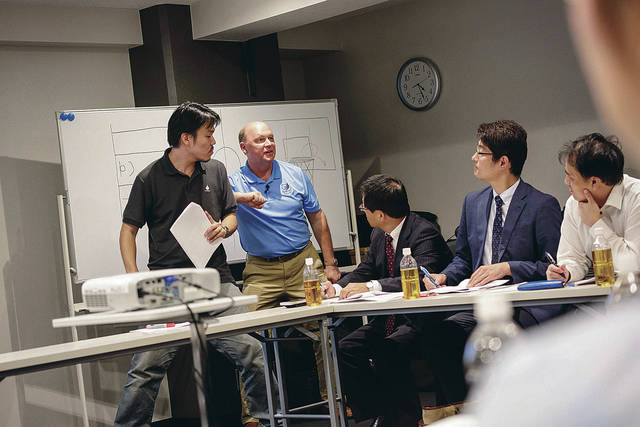For Japan, NBA 101 is now in session

NEW YORK TIMES
Pete Pranica, the announcer for the Memphis Grizzlies, taught a workshop for Japanese announcers in Tokyo on how to commentate an NBA game. The residents of the world’s third-largest economy know little about basketball, but the NBA hopes to change that.
TOKYO >> Pete Pranica, the longtime television voice of the Memphis Grizzlies, appeared to be square dancing as he stood in a small conference room here, demonstrating for Japanese broadcasters the NBA violation of thrusting out a hip while setting a screen.
Viewers, he told his fellow commentators through an interpreter, expect “that you know all there is to know about the NBA.”
For two days in late September, using a dry-erase board, video and a Power Point presentation, Pranica patiently and deftly explained everything from rules changes to team-by-team outlooks to preparing to broadcast a game. His attire — a Grizzlies polo shirt and khakis — was casual, but his message was not.
The NBA has had a presence in Japan, the world’s third-largest economy, for three decades and has played 12 regular-season games there since 1990.
Yet, some of the broadcasters attending Pranica’s workshop had little experience calling league games, having spent much of their careers covering baseball and soccer or high school basketball.
Was it true, Pranica was asked, that the collective jersey numbers of the three referees at each NBA game must not exceed 100?
Don't miss out on what's happening!
Stay in touch with breaking news, as it happens, conveniently in your email inbox. It's FREE!
“Not that I’m aware of,” he said diplomatically.
Hence, the urgency of Pranica’s seminar.
In Japan, the NBA is not viewed with the same fervor or depth of knowledge as in other Asian countries like the Philippines, where basketball is the No. 1 participation sport. In China, the top NBA market outside the United States, an estimated 300 million people play the sport and 640 million cumulative viewers watched league programming last season.
“The Philippines is a beacon for us when we think about the kind of popularity we’d love to see in markets like Japan,” Matt Brabants, the NBA’s senior vice president for global media distribution and business operations, said in a telephone interview. “And we have to work at that.”
To extend its footprint in Japan, the NBA last season partnered with Rakuten, the giant e-commerce and internet company headquartered in Tokyo, to distribute its live games throughout the country. Rakuten, which aspires to rival Amazon, also became a global sponsor of the league in a multiyear deal reportedly worth $225 million.
Separately, Rakuten became a jersey sponsor of the Golden State Warriors for a reported $60 million over three seasons. The company name appears on the team’s jerseys and practice facility.
Rakuten represents the NBA’s most inclusive media partnership ever in Japan. But while a number of Japanese baseball and soccer players have enjoyed prominent international careers, only one Japanese-born player has ever played in the NBA.
Yuta Tabuse, a guard, played 17 minutes in four games for the Phoenix Suns in 2004 — not the kind of career that could enthuse a country as, say, Yao Ming’s Hall of Fame career in Houston did for promoting basketball in China.
In an island nation like Japan where space is at a premium for its 127 million people, there are only 30 basketball playgrounds, which restricts the development of a playground culture, according to FIBA, the sport’s international governing body.
In recent years, the management of professional basketball in Japan has been in turmoil. The Japan Basketball Association was suspended in 2014 by FIBA for operating two competing professional leagues.
The matter was resolved, and the Japanese basketball federation was reinstated in 2015. The two pro leagues merged into what is now a three-tiered league called the B.League, which began play during the 2016-17 season and features relegation and promotion like a professional soccer league.
Yet, the rules and tactics of basketball are not as widely understood in Japan as in the Philippines and China, said J.R. Henderson, a Californian who played on UCLA’s 1995 NCAA championship team and has played professionally in Japan since 2001.
“It’s not about the NBA; it’s about basketball,” Henderson said in a telephone interview. “They don’t understand the rules or substitution patterns, why timeouts are called at certain times in a game, how come sometimes the game is fast and why sometimes you slow it down.”
Henderson, now 41, played 30 games for the then Vancouver Grizzlies during the 1998-99 NBA season and has become a naturalized Japanese citizen known here as J.R. Sakuragi.
He plays for the Aisin Seahorses of the Japan league’s top division. His teammates have an intimate knowledge of the NBA and try to mimic its stars, Henderson said. Within his team, he said, “It’s no different than fans in the States.”
Outside his basketball circle, though, Henderson said, “You would have a hard time finding someone who knows who Carmelo Anthony is.”
But opportunities are growing for Japan to become more familiar with the NBA’s players. The Rakuten deal is giving the league broader exposure. A basketball magazine called Dabudori (Double Dribble) has been available for the last year. And dozens of NBA stars are expected to participate in the 2020 Tokyo Olympics.
Yuta Watanabe, a rookie 6-foot-9 forward from Japan who played at George Washington, has signed a two-way contract with the Memphis Grizzlies for the 2018-19 season, permitting him limited transfers from the team’s G League, or developmental teams.
Rui Hachimura, a 6-8 forward who could be Japan’s top basketball prospect ever, is entering his junior season at Gonzaga. He is a mainstay on Japan’s national team and, according to Gonzaga, only the fifth Japanese-born men’s player to participate in Division I basketball.
A Japanese player who could succeed in the NBA “for more than a couple of games, say two or three years, would make a huge difference,” Henderson said.



